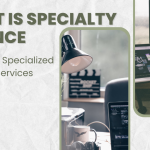Commercial Insurance: In the dynamic landscape of the business world, where opportunities and challenges coexist, managing risk is a paramount concern for entrepreneurs and business owners. Commercial insurance stands as a crucial tool in this endeavor, providing a shield against uncertainties that could otherwise jeopardize the stability and growth of businesses. This article delves into the depths of commercial insurance, offering insights into its various aspects, benefits, and how it aids in navigating the intricate world of risk.
Introduction
Risk is an inherent part of any business venture. From unforeseen accidents to legal liabilities, businesses encounter a myriad of challenges that can disrupt operations and impact financial stability. This is where commercial insurance steps in, offering protection against a range of potential threats. But what exactly is commercial insurance? At its core, commercial insurance is a financial safety net that shields businesses from losses resulting from unexpected events. These events can include property damage, liability claims, employee injuries, and more.

Types of Commercial Insurance
Property Insurance
Property is often a business’s most valuable asset. Whether it’s a physical storefront, office space, or equipment, protecting these assets is crucial. Property insurance covers losses incurred due to damages to physical assets caused by events such as fire, theft, vandalism, or natural disasters. For instance, imagine a retail store that falls victim to a fire. Without property insurance, the cost of rebuilding and replacing inventory could be crippling. Property insurance not only helps in recovering from such setbacks but also ensures business continuity.
Liability Insurance
In today’s litigious environment, legal claims can arise from various angles, posing a significant threat to businesses. Liability insurance comes to the rescue by providing coverage for legal responsibilities arising from bodily injury, property damage, or personal and advertising injury. Consider a scenario where one customer slips and falls in a restaurant due to a wet floor, resulting in injury. Liability insurance would cover the legal expenses incured and potential settlement costs. By mitigating financial risks stemming from lawsuits, liability insurance safeguards a business’s financial health.
Workers’ Compensation Insurance
Employees are the backbone of any business, and their well-being is paramount. Workers’ compensation insurance ensures that employees are protected. It provides medical benefits and wage replacement during recovery, reducing the financial burden on both the employee and the business. This type of insurance is particularly important in industries with higher physical risks, such as construction or manufacturing. By prioritizing employees’ health, businesses foster a culture of safety and loyalty.
Assessing Business Risks
Before diving into insurance specifics, businesses must first identify potential risks. These can be external factors such as economic downturns, regulatory changes, or industry shifts, as well as internal factors like operational inefficiencies or data breaches. Conducting comprehensive risk assessments helps businesses understand the nature and severity of each risk, enabling informed decision-making.
Quantifying risk severity involves evaluating the potential impact on business operations and determining the probability of occurrence. This assessment guides businesses in prioritizing risks and tailoring insurance coverage to address specific vulnerabilities. By customizing coverage, businesses avoid over-insurance while ensuring protection against the most relevant risks.
Choosing the Right Commercial Insurance
Selecting the appropriate commercial insurance requires careful consideration. Collaborating with experienced insurance agents or brokers is advisable, as they possess insights into the intricacies of the insurance landscape. Agents can guide businesses in comparing policy options, considering factors such as coverage limits, deductibles, and premiums.
Industry-specific needs play a significant role in insurance decisions. Different sectors face varying risks; for example, a tech startup might prioritize cyber insurance due to data security concerns, while a manufacturing company might focus on product liability coverage. Tailoring insurance to match industry-specific challenges ensures comprehensive protection.
Claims Management and Risk Mitigation
Accidents and setbacks can still occur, even with the best preventative measures in place. In such cases, effectively navigating the claims process is vital. Promptly reporting incidents, documenting evidence, and collaborating with insurance providers are key steps. Claims adjusters and support teams work alongside businesses to ensure claims are handled efficiently.
Beyond claims management, proactive risk mitigation is equally important. Implementing preventative measures, such as employee training, safety protocols, and cybersecurity measures, can significantly reduce the occurrence and impact of risks. This not only aligns with insurance providers’ requirements but also fosters a culture of responsible risk management within the business.
Case Studies: Learning from Real Scenarios
Real-world examples often provide the best lessons. Let’s explore two hypothetical case studies:
Case 1: Natural Disaster and Property Damage A boutique hotel faces severe flooding due to heavy rainfall, causing substantial damage to its premises. Thanks to comprehensive property insurance, the hotel can swiftly repair damages and continue operations. This highlights the importance of disaster preparedness and the role of insurance in ensuring business continuity.
Case 2: Product Liability Lawsuit A toy manufacturer faces a lawsuit when a defective product injures a child. The company’s liability insurance covers legal expenses and settlement costs, preventing a potentially devastating financial blow. This case underscores the significance of quality control and the protection provided by liability insurance.
Trends in Commercial Insurance
The landscape of commercial insurance is evolving, influenced by technological advancements and shifting business models.
Technological Advancements
Artificial Intelligence (AI) and data analytics have transform the insurance industry. Insurers use these tools to streamline underwriting processes, assess risks more accurately, and offer tailored coverage. This advancement enables businesses to obtain more precise and cost-effective insurance solutions.
Changing Business Landscape
The rise of remote work and the increasing reliance on digital platforms have introduced new risks, particularly in the realm of cybersecurity. Cyber insurance has emerged as a specialized coverage, addressing data breaches, ransomware attacks, and other cyber threats. Businesses must adapt their policies to suit the modern business landscape.
FAQs About Commercial Insurance
Q1: Is commercial insurance mandatory for all businesses? A1: While some types of commercial insurance, like workers’ compensation, may be legally required depending on your location and industry, other forms of insurance are generally recommended to mitigate risks and protect your business assets.
Q2: How do I determine the right level of coverage for my business? A2: Working with an experienced insurance agent or broker can help you assess your business’s unique risks and recommend appropriate coverage levels. They can analyze your operations, assets, and potential liabilities to provide tailored advice.
Q3: Are there industry-specific insurance options? A3: Yes, many industries have specialized insurance options to address their unique risks. For instance, healthcare businesses might need malpractice insurance, while construction companies might require builder’s risk insurance.
Q4: Can I bundle different types of commercial insurance together? A4: Yes, insurance providers often offer package policies that combine various coverages into a single policy. Bundling can mostly lead to cost savings and simplified management of your insurance portfolio.
Q5: How do technological advancements impact commercial insurance? A5: Technological advancements, such as AI and data analytics, allow insurers to assess risks more accurately and efficiently. This means that businesses can benefit from more personalized and precise insurance solutions. Additionally, these advancements can streamline the claims process and improve overall customer experience.
Q6: How can businesses foster a culture of risk management? A7: Fostering a culture of risk management involves educating employees about potential risks and encouraging them to actively participate in risk reduction measures. Regular training, open communication, and incentivizing safety practices can all contribute to building a risk-aware organization.
Q7: Can commercial insurance help with business continuity planning? A8: Absolutely. Commercial insurance, particularly property insurance, plays a critical role in business continuity planning. In the event of unexpected events like natural disasters or accidents, insurance coverage can provide the financial support necessary to recover and resume operations.
Q8: Are there any drawbacks to relying solely on commercial insurance? A9: While commercial insurance is an essential tool for risk management, it’s important to remember that it doesn’t eliminate all risks. Businesses should also implement robust risk mitigation strategies, such as strong internal controls, cybersecurity measures, and workplace safety protocols.
Additional Resources
To further enhance your understanding of commercial insurance and risk management, here are some recommended resources:
- National Association of Insurance Commissioners (NAIC): Explore valuable information about insurance regulations, consumer education, and more.
- Insurance Information Institute (III): Access a wealth of educational resources, including articles, videos, and tools, to help you make informed insurance decisions.
- Small Business Administration (SBA) – Insurance Guide: Learn about the types of insurance your small business might need and how to choose the right coverage.
- Reach out to local insurance agents or brokers for personalized guidance and insights tailored to your specific business needs.
Conclusion
In the ever-evolving landscape of the business world, commercial insurance remains a steadfast ally in navigating risks. From property damage to legal liabilities, businesses encounter a diverse array of challenges that demand proactive risk management strategies. Through comprehensive coverage options, industry-specific solutions, and the insights provided by this article, businesses can fortify their operations and ensure financial stability.
Embrace the power of commercial insurance as an essential tool for safeguarding your business interests. By understanding the nuances of different insurance types, assessing your unique risks, and collaborating with experienced professionals, you can confidently steer your business through uncertain waters, emerging stronger and more resilient on the other side. Remember, managing risk isn’t just a requirement; it’s a strategic imperative for sustained success in the competitive business world.
Commercial insurance is more than just a financial product; it’s a strategic tool for risk management. Navigating the complexities of the business world requires a proactive approach to mitigate potential threats. By embracing the insights provided by commercial insurance, businesses can safeguard their operations, employees, and financial stability. The ever-changing business environment demands adaptation, and commercial insurance remains a steadfast ally in this journey.
Thank you for reading. Also read: Securing Your Team: The Essentials of Employment Insurance | 2023
Allstate Insurance Near Me: Finding Your Perfect Coverage 2023
Professional Liability Insurance: A Lifesaver for Service-Based Professions | 2023








